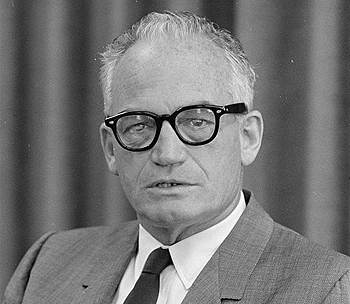Remembering Barry Goldwater’s historic campaign

By John Hendrickson
This year marks the 50th anniversary of the Republican Party nominating Arizona’s U.S. Sen. Barry M. Goldwater for President in 1964.
Goldwater, known as “Mr. Conservative,” not only campaigned on principles in 1964, but also launched the post-war conservative movement in American politics.
MR. CONSERVATIVE: It was 50 years ago that Barry Goldwater was nominated to carry the Republican banner.
Before Goldwater’s nomination a conservative intellectual movement was well under way with numerous conservative and libertarian academics and writers — especially William F. Buckley’s National Review magazine — that were standing “athwart history, yelling stop” against the rising tide of New Deal liberalism.
The Republican Party itself was divided between a liberal Eastern establishment led by Wendell Willkie, Thomas E. Dewey, George Romney, Nelson Rockefeller and others who wanted to make peace and pursue “moderation” towards the New Deal legacy.
The conservative element within the Republican Party was led by former President Herbert Hoover, Gen. Douglas MacArthur, U.S. Sen. Robert A. Taft of Ohio and others who wanted to restore limited government and warned of the dangers of Soviet communism both at home and abroad.
The conservative forces in the Republican Party were mostly from the Midwest and Western states.
It was this band of Republican conservatives that Goldwater joined and eventually became the leader of in the aftermath of Taft’s death. Goldwater continued the crusade to restore constitutional limited government, and he criticized President Dwight D. Eisenhower’s “dime-store” New Deal. Even with Eisenhower’s two landslide victories in 1952 and 1956, conservatives were disappointed by Ike’s “moderate Republicanism.”
By 1964, conservatives working through the grassroots went to the Republican convention in California to nominate Goldwater for president. The convention was divided, and the Eastern establishment led by New York Gov. Nelson Rockefeller tried unsuccessfully to stop the Goldwater movement. In fact liberal Republicans went so far as to paint Goldwater and the conservatism he stood for as “extreme.”
In his address accepting the Republican presidential nomination, Goldwater told the delegates the nation has “followed false prophets” and that “we must, and we shall, return to proven ways — not because they are old, but because they are true.”
At the center of Goldwater’s philosophy was liberty based upon the Constitution, and Goldwater, who was unapologetic in his conservatism, fired back at the liberal Republicans with perhaps the most famous words in the history of all Republican conventions: “I would remind you that extremism in defense of liberty is no vice. And let me remind you also that moderation in the pursuit of justice is no virtue.”
Goldwater’s philosophy was outlined in his book “The Conscience of a Conservative,” which Patrick J. Buchanan described as the conservatives’ “new testament” that “contained the core beliefs of our political faith.”
In his convention speech, Goldwater told delegates that “rather than useful jobs in our country, people have offered bureaucratic ‘make work;’ rather than moral leadership, they have been given bread and circuses, spectacles, and yes, they have even been given scandals.” He also addressed the anxiety and despair that was confronting the nation — some of the same issues we are confronted with today.
In the end Goldwater lost the 1964 election in a landslide, and even though “experts” argued that conservatism was dead, Goldwater’s campaign built momentum for the conservative movement and provided a stronghold for conservatives within the Republican Party. It also gave birth to a new leader of the conservative movement — Ronald Reagan, whose speech “A Time for Choosing” on behalf of Goldwater launched his political career.
Today, conservatives can look back on Goldwater and remember his defense of limited government, his belief that the Constitution is the backbone of liberty, and his assertion that conservative principles are not outdated, nor do we need to be ashamed or apologize for standing for principle.
John Hendrickson, Research Analyst, Public Interest Institute, 600 North Jackson Street, Mount Pleasant, IA 52641-1328. Ph: 319-385-3462, Web site: www.LimitedGovernment.org. Contact him at Public.Interest.Institute@LimitedGovernment.org.
Copyright © 2014 Public Interest Institute, All rights reserved.







